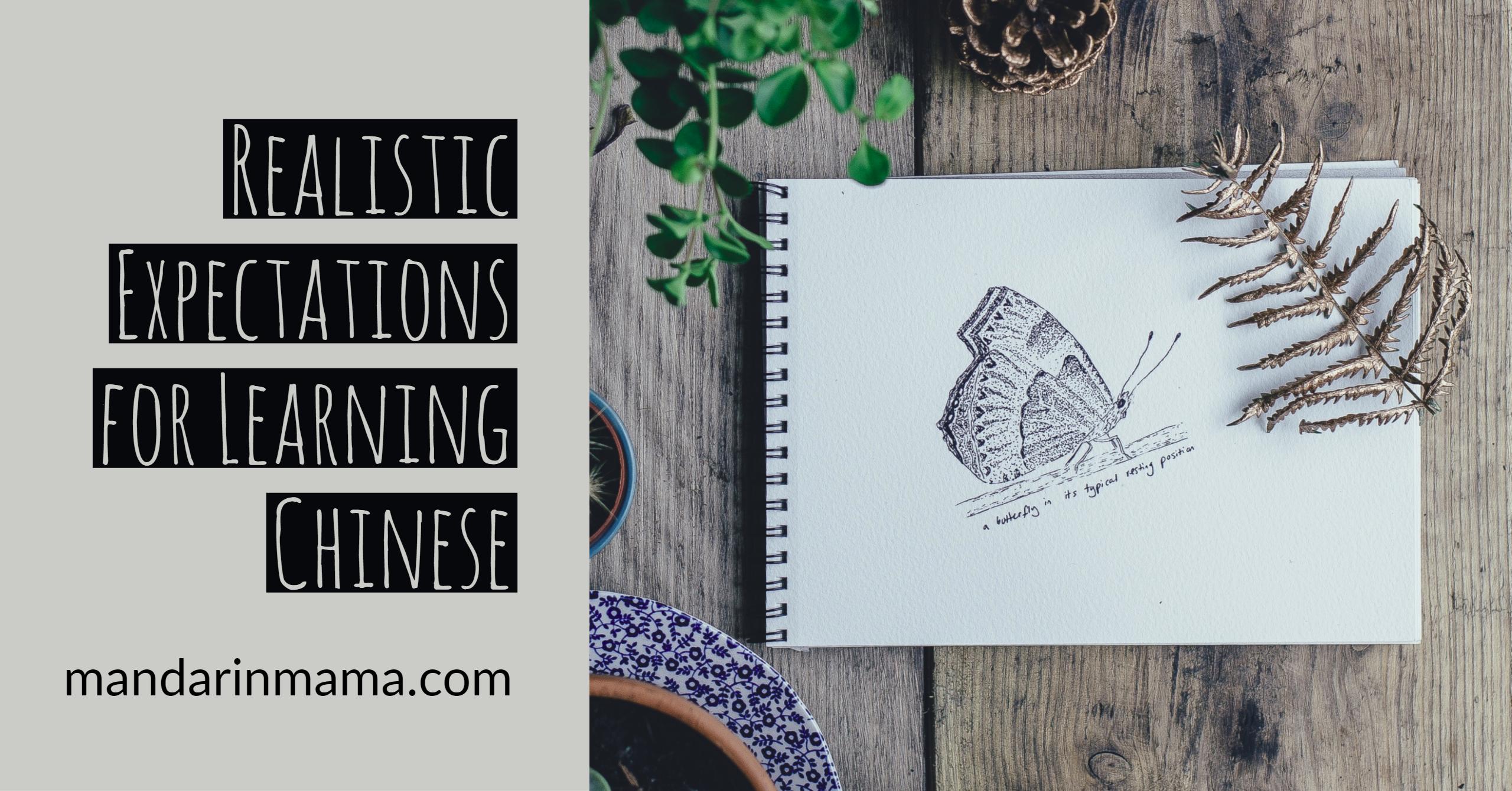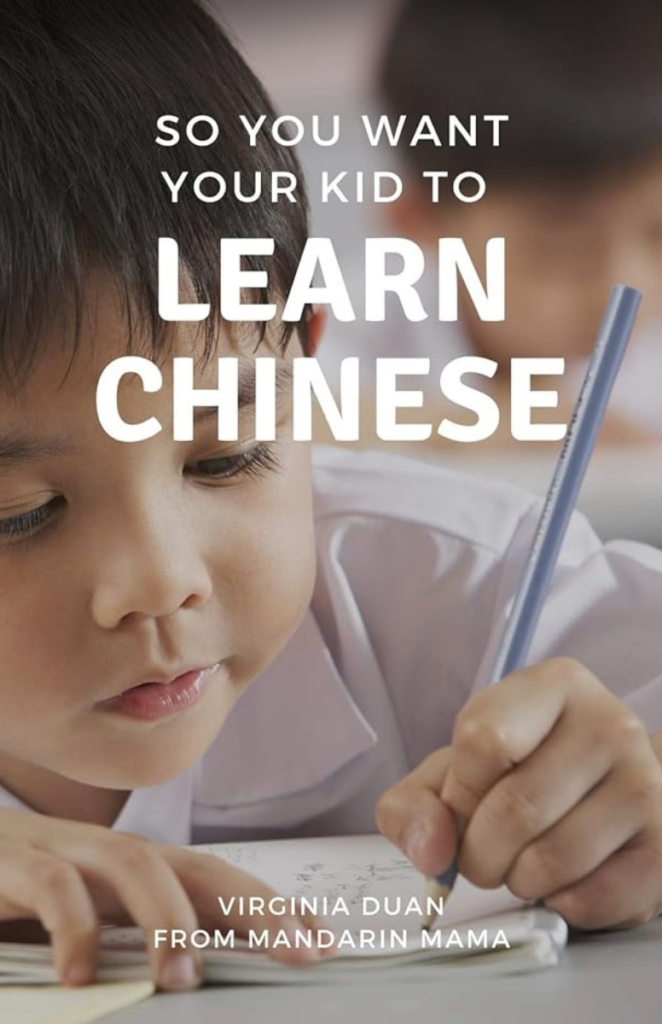 **This article uses affiliate links and was originally part of a series of posts that became my book, So You Want Your Kid to Learn Chinese. Updated January 14, 2020.
**This article uses affiliate links and was originally part of a series of posts that became my book, So You Want Your Kid to Learn Chinese. Updated January 14, 2020.
I started off my So You Want Your Kid To Learn Chinese Series by saying you need to clarify your goals. After all, there really is no point in forcing your kids to learn a bunch of Chinese characters if you really only want them to understand the language and/or speak it. Likewise, if you want your kid to be functionally literate, you can’t expect them to get there just by being in a heritage family.
In this post, I want to discuss some of the unrealistic expectations families (including sometimes, the children themselves) have for learning Chinese in an English speaking country. If I happen to skewer something you personally hold dear or believe, let’s just pretend I’m trying to be helpful and not a superior prat.
what are some common pitfalls while teaching kids Chinese?
Since family situations and backgrounds differ, I have categorized some common pitfalls arranged by family types. Certainly these concerns can be present in all families – and you may personally identify with multiple situations. As with all advice on the internet, your mileage may vary.
1) First Generation Heritage Families (both are heritage parents and native level speakers who immigrated to an English speaking country at a later age)
You might assume that just because both parents are native level Chinese speakers that their kids will just somehow magically become fluent in speaking and comprehension. Alas, if that were true, 100% of my American Born Chinese (ABC) friends and the early Brought Over By Airplane (BOBA) friends would be fluent.
In fact, my friends run the gamut from being English-only speakers to completely bilingual in both English and Chinese to a mishmash of somewhere in between.
Chinese fluency requires intention.
Yes, the fact that you are a heritage and native speaker definitely puts your kids at an advantage for learning Chinese, but you have to actually speak Chinese. And not just speak a little. A LOT. You pretty much have to predominantly speak Chinese in order for your kids to understand it at a fluent level.
Not only that, if you want your kids to respond in Chinese, you have to require them to do so.
This is easier said than done and not a problem endemic only to heritage families.
If you read my other posts, I do discuss how we can encourage our kids to speak and use Chinese. Ultimately, it depends on the child. Often, the more you force a kid to do something, the more they rebel and the last thing you want is for your kid to instinctively hate everything Chinese.
In addition, many heritage families worry about their children acquiring English. For completely legitimate and understandable reasons, parents are very concerned about their kids achieving native level proficiency in English. The U.S. is cruel to immigrants; they are often mocked for speaking with an accent and not sounding “right.”
Due to fears of their children not assimilating and not being accepted by their peers, many heritage families focus primarily on learning English. Chinese will fall by the wayside because of limited time, energy, and resources.
It’s a recurring story that one need only to look at America to see is true. Short of the First Nations in the U.S., everyone else’s ancestors started off as immigrants (not all of them voluntarily) – and not all of them came from English speaking countries. And yet, even one generation later, folks were assimilated into American culture and people lost their “mother” tongues.
This is not a judgment on these peoples for assimilating. There are many legitimate social pressures and considerations that cause kids and families to “lose” their original languages. I personally find it sad, but many people don’t think so and we can both be right.
Again, I cannot overemphasize: Chinese fluency requires intention.
The First Generation Heritage Family type is my family of origin. My parents immigrated from Taiwan for their MBAs and from the start, they decided they would only speak to my brother and me in Chinese. Though I was born in the U.S., I learned English in kindergarten and for most of my early life, didn’t even know my parents could speak English.
My parents used to tell a story of how I stared at my father when he spoke to a plumber in English. Incredulous, I asked, “Daddy, you speak English?!?”
Funny enough, sometimes, as a first generation parent, you are thwarted by your own well-meaning parents and friends who have never raised children in a different country. You will be told to make your kids focus on English out of the same fears I listed above. Then, you will be chastised for your kids not having sufficient Chinese to communicate with your family back at home.
Honestly, you don’t have to worry about your kids not learning English at a native level.
Unless you actively seek out opportunities in Chinese, all of your child’s social, educational, extra-curricular, and cultural activities will be in English. There is no way your kids won’t be amazing at English. It is the majority language and the lingua franca of our country and the world. Their English will be supported, nurtured, and thrive.
However, their Chinese will not be thus supported. Likely, your children’s only exposure will be your from your nuclear family, weekly Chinese school, and maybe a Chinese house of worship or community center. Trust me: your children’s Chinese will suffer as soon as they start school.
The only reasons why my Chinese is even as good as it is (which is not really), is because in addition to my parents forcing me to speak Chinese at home, I went to a weekly Chinese school, our social circles were 99% Taiwanese, and we attended a Chinese church.
In regards to weekly Chinese school, while many people scoff at its efficacy, I know my Chinese wouldn’t be as good as it is without weekly Chinese school classes until I graduated high school. For many families, this is the only way to ensure consistent exposure to Chinese language, culture, and people.
My main critique is that weekly Chinese school is not enough to gain functional Chinese literacy. For myself, it was frustrating and annoying to be reading Chinese at barely first grade level when I was reading college level English literature. We may have been better served learning how to read and order from menus.
Again, the main benefit of a weekly Chinese school is its consistency. If you don’t have the discipline or ability to replicate that at home, it is a good alternative. But again, you need to have appropriate expectations.
Another thing to look out for – and this again goes for all families – is overestimating your child’s actual Chinese ability. Now to be clear, if your goal is for your kids to speak and understand Chinese, this may not be a problem. It is when you also want your kids to read and write when the overestimating happens. Usually, it is when your kid’s speaking and understanding Chinese is fluent and masks the lack of reading and writing ability.
Also, this is not to discount your child’s awesome Mandarin at age two, but that is not enough. My children were fluent and exclusively spoke Chinese at 4 and 6. Now that they’re 10, 8, 6, and 3, I have to compel them to speak Chinese. I don’t even know if my youngest can speak it!
It’s easy to be fluent before the social pressures to be pop-culture savvy and whatever else the brutal school society demands our children to sacrifice at the altar of fitting in. If my children retain their Chinese at functional level when they graduate high school, you can be sure I’ll brag then. But until then? I know I’m on borrowed time.
Remember: many kids immigrate from Chinese speaking countries at later ages and still lose their Chinese due to these same social pressures.
There are no guarantees.
2) 2nd+ Generation Heritage Families
Depending on speaking ability, these families might be in the same boat as Non-Heritage families. If that is the case, I refer you to that category. However, for the sake of this post, let’s pretend that both parents are Chinese speakers but perhaps with varying levels of fluency. If only one parent is a Chinese speaker, I’ll refer you to the Mixed Heritage Families category.
I cannot overstate this stark fact: Chinese fluency requires intention.
Your children will not learn Chinese through diffusion.
You will have to work. You will have to dust off your (perhaps) rusty Chinese and not only speak it to your children, but to each other in Chinese. That is usually the most difficult because though you know Chinese, it is likely not your habit to speak it with other people – including your spouse.
Similar to 1st Generation parents worrying their kids won’t speak English well enough, you may feel your Chinese isn’t good enough to speak or pass along to your children. However, any Chinese is better than none – and if your children are small and very young, you still know more Chinese than they do!
Even though I lived in LA for nine years, I rarely used Chinese for that decade unless it related to food. Then, when I moved back up to the Bay Area, unless I was speaking to my mother with whom I lived, I didn’t use Chinese either. Then, I had Cookie Monster and I found myself speaking Chinese all the time.
It was weird. It was awkward. And though I knew a lot of words, I certainly didn’t know all the more random animals, dinosaurs, trucks, etc. that my little boy required. Many of these terms my mother didn’t even know!
However, my Chinese has improved – and improved a lot!
Thanks to technology, Chinese dictionaries are at our swipey fingertips. Plus, I am constantly going online, taking my kids to Chinese classes and activities, and surrounding myself with Chinese speaking people. As a result, my Chinese has grown along with my children’s.
When I first started, I couldn’t yell at my kids in Chinese because I lacked the proficiency to think that quickly. I am pleased to inform you that I now can yell at my kids in Chinese.
I am now at the point where my older kids have started to surpass my abilities – especially in the literacy department. I still comprehend more and am better at speaking – but that is because I’m an adult with an adult’s understanding of the world. Plus, I have decades of practice in speaking.
Of all households, likely this one and the Mixed Families will have the best idea of what your kids’ future will look like since you experienced something similar. Learn from your own insights and from those of your peers.
As with the 1st Generation families, you may also experience push back and outright non-compliance from your parents. Sometimes, it is the same concern in terms of fearing for your children’s English. But sometimes, your parents can see it as a repudiation of how they raised you – especially if your Chinese isn’t as good as you’d like. (As if your wanting your kids to be fluent in Chinese is somehow judging them for your lack of Chinese skills.)
3) Mixed Heritage Families
This type of family is the kind that my current family is: one parent who is fluent in Chinese and one who is not.
In some instances, often because of the obvious reality, there can be more intentional Chinese learning in these families because the one parent who does speak Chinese is very aware of being the primary Chinese speaker in the home. As a result, the Chinese speaking parent might be a little more conscious of speaking Chinese to their child versus just “letting it happen.”
As with the previous families, your children will not all of a sudden learn Chinese.
Depending on who is the Chinese speaker and their level of fluency and who is the primary caregiver, your children’s Chinese exposure may vary from a lot to a little. If you are working outside of the home and your partner is the one at home but doesn’t speak Chinese, you cannot expect your kids to have as much Chinese under their belts as someone’s kids who stay at home with a parent who does speak Chinese.
That isn’t fair to you, your spouse, or your children.
Furthermore, if there is little to no Chinese support, whether from Chinese family members, other family and friends, schools, your child’s exposure to Chinese will just not be enough. If you want the additional expectations of your kids being literate, unless you are going to be putting your kids in Chinese school or have tutors (perhaps even during the limited time you have with them after work), that is completely unrealistic.
Another factor to consider is if your partner is fluent in a language other than English or Chinese and would also like to pass their language down to your children. This is totally doable – but again, requires a lot of work and careful planning. I don’t think your kids’ Chinese will suffer as a result, but again, there is limited time and resources.
You either have to adjust your expectations, or put in the necessary work.
As with all the other families, you may get a variety of pushback. Add into that mix your in-laws who may not share your same cultural background and you may have many more areas of conflict about language, respect, communication, inclusiveness, etc.
In our family, since I am a SAHM and also the Chinese speaker, my children are exposed to a lot of Chinese. My mother is also in the area, we are surrounded with families (most of whom are also in mixed families) who are also big on teaching their kids Chinese, my MIL is supremely supportive, and Hapa Papa is very supportive as well. He’s even learned a few Chinese words and tries to use them whenever he can.
Now that my children are older and the family language is English, it is very difficult to make them speak Chinese to me. Gamera (8) constantly yells back that I understand English so it shouldn’t be a problem. Thankfully, my kids still speak Chinese to the people they have slotted in the “Speak Chinese Only” category. Clearly, I do not fit!
While we can encourage our children to choose Chinese even when English is more attractive and easy, our children will ultimately do what they want. There is only so much we can “force” a language upon them if they don’t want it. Your mileage may vary and it is far better to have a good relationship with your children than it is to have reluctantly bilingual children who hate you.
4) Non-Heritage Families (both parents are non-ethnically Chinese and non-speakers)
I don’t want to be Debbie Downer here, but I have to say it.
If you’re a non-heritage family and cannot speak Chinese, and you’re expecting your kid to be fluent just because they go to a Mandarin Immersion school, you will be mightily disappointed.
To quote my dear friend, Fleur, “Non-heritage, non-speaking parents who think their kids are amazing in Mandarin Immersion school are delusional. There’s no way they would know if they themselves don’t understand Mandarin. Especially if they are non-Asian. Folks will blow smoke up their ass and say their kid is amazing. Like a novelty.” [emphasis mine]
Look. It’s totally possible that your kid really doesn’t have an accent.
But from what I’ve seen of YouTube and newspaper article videos, even the “best” Mandarin Immersion schools in America (those from the Minnesota Mandarin Immersion Collaborative), if the kids are not from a heritage/speaker family, the Chinese is not that great.
Ok, let me re-state that. It’s not that the kids aren’t impressive in the sense of, “Hey! Non-Chinese kids speaking Chinese! Awesome!” I could understand what they were saying – which is the REAL goal of Mandarin Immersion – and they seemed to effectively communicate in Chinese. But native level Mandarin? Not a chance.
In addition, your family might get some pushback from heritage families (I addressed some of those concerns in a previous post) and depending on the demographics of your Mandarin Immersion school (tutor/Chinese school/etc.), your child may be in the minority and not have the social life you thought they would.
Some of the cold shoulder you receive from heritage families can be due to the feeling of a “safe space” being invaded and you are the invader/interloper who doesn’t belong. I won’t get into it all here, but suffice to say, that feeling you’re feeling is what heritage families and minority folks experience DAILY. Like while going to the supermarket. Though I am not an advocate of people getting hurt or excluded, know that there really won’t be much sympathy from other parents – especially if your family is white.
Is that fair? Is that right? No.
But unless you have been in the heritage families’ shoes, you really don’t know what they have gone through, either. And quite frankly, you have the privilege to side step any of your discomfort and just leave the school. Minorities don’t really have that option. They can’t just quit life.
And before you come at me with “They can just leave America then!” – I would just ask that you examine that statement and unpack it carefully before you continue down that vein. Think of all that you are assuming and figure it out in your own space.
Why all the comments about race?
Well, because it’s true, it happens, and it’s real.
Chinese is not a “white” language so of course, the language is integrally a part of the ethnic people. If you can’t handle that and don’t really want to navigate the murky and occasionally choppy waters of race and identity and whiteness or “otherness,” perhaps this is not the best language to choose.
In the end, regardless of family type, teaching your kids Chinese will require intention. The process can be tough and lonely but also extremely rewarding. I wish you all the best. 加油!






